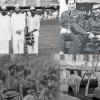A visionary leader

The Legal Framework Order (LFO) was issued as President's Order No. 2 of 1970 by the President of Pakistan and Chief Martial Law Administrator General A.M. Yahya Khan on March 30, 1970. The Order provided some basic principles for the future Constitution of the country. On the time limit on framing the Constitution, the LFO explicitly stated in Article 24 that it must be done within a period of one hundred and twenty days from the date of the Assembly's first meeting and on its failure to do so it shall stand dissolved. Furthermore, Article 25 went on to stipulate: "The Constitution Bill, as passed by the National Assembly, shall be presented to the President for authentication. The National Assembly shall stand dissolved in the event that authentication is refused".
The LFO as a whole, and these two provisions in particular, created a great degree of scepticism among politicians and members of the civil society. Many questioned the propriety of participating in such a straight jacketed election and asked Sheikh Mujibur Rahman to boycott it. In response, Bangabandhu declared, "Let me get the mandate of my people. I will tear the LFO into pieces. The Constitution would be drafted incorporating the Six Point programme, Awami League's election manifesto".
In the process, it could be affirmed in unqualified term that the election of 1970 was the main source of our internal strength, external support and the only legal basis of the proclamation of our independence. By taking part in the election, Sheikh Mujib not only exhibited his foresight but also elevated himself from a politician to a statesman. Without taking part in an election there is no other valid and trusted mechanism to prove the popularity of a political party, its leader and support for its platform. There was widespread belief in the military camp and their allies among the Bengalis that Sheikh Mujib would not get more than 60 percent of the national assembly seats allotted to East Pakistan. This was reaffirmed by Yahya Khan to Henry Kissinger, who wrote, "I took the opportunity to ask Yahya what would happen to powers of the President after the election. Yahya could not have been more confident. He expected a multiplicity of the parties to emerge in both West and East Pakistan, which would continually fight each other in each wing of the country and between the two wings; the President would remain arbiter of Pakistan's politics".
However, the election results were a big surprise for both the rivals, and to some extent, the friends of the Awami League. In the words of General Fazal Muqueem Khan, "The election results have placed the President on the horns of dilemma. The scheme of things he has worked in his mind, with aid and advice of his advisors, has been shattered. He had to make a fresh plan".
The election results formed the core basis of our formal and legal declaration of independence on April 10, 1971. To justify transition from six-point to one point, it used seven "whereas" clauses to declare: "We the elected representative of the people of Bangladesh…declare Bangladesh to be a sovereign Republic and thereby confirming duly made declaration of independence already made by Bangabandhu on March 26, 1971".
On March 31, 1971, the Indian Parliament passed a resolution pledging sympathy and support for the people of East Bengal in their struggle for the transfer of power to their legally-elected representatives.
To what extent the election results were used to drum up support by many members of both Houses of the US Congress against the hostile policy of the Nixon administration could be understood when senators and congressmen in the Capitol Hill led by Senator Kennedy asserted, "Sheikh Mujib's only crime was the winning of a free election sponsored by a military regime that later refused to abide by the election mandate. In those elections the people of East Pakistan had spoken in one voice. They had massively elected the candidates of the Awami League, endorsing a platform, which called for autonomous East Bengal. Bangladesh was the rallying cry in those elections, as it remains the rallying cry today".
It is only rational to conclude that in the absence of the election mandate of 1970, our freedom struggle would be absolutely devoid of legal, democratic and moral basis and it would face the same eventuality as experienced by Biafra (of Nigeria). Anyone, including Sheikh Mujibur Rahman, leading the nation to that self-inflicting catastrophe would meet the same fate as meted out to Colonel Ojuku of Biafra.
It would be appropriate to cite the sentiment of one of our illustrious sons, Dr. Mohammed Yunus, while a student in USA, about the arrest of Bangabandhu. He recollected, "While speculating what might have happened to Sheikh Mujib, finally a news came that he has been arrested at Chittagong railway station while he was fleeing from the army. We were in tears after hearing the news. Until then we were making all kind of possibilities of Sheikh guiding the nation at war from some underground bunker. All that the nation needed was his live voice over the radio. Pakistan had no chance with all their sophisticated fire-power against his voice". Similar feelings had also reverberated in the minds of millions at the outset.
During the nine-months of genocide, armed struggles and untold sufferings, Sheikh Mujib's name resonated ceaselessly in the hearts of millions of Bengalis, not only within the geographical boundaries of Bangladesh, but all over the world, and he remained a demigod to the people of Bangladesh. In the words of General Rao Forman Ali, "Ninety percent of the people of Bangladesh were taken in by the magical power of Sheikh Mujib, and they were ready to sacrifice their lives for the creation of Bangladesh". Sheikh Mujib was not a revolutionary guerrilla leader like Che Guevara or Mao Zedong; the source of his strength did not come from the barrel of the gun, rather, from the mandate and trust of his people. He rose to such a stature in the eyes of his people that he realised that it would have been cowardly if he sought shelter in a safe haven, leaving his people in the midst of death, destruction and genocide.
Moreover, while he was in the enemy's custody, there were worldwide demands for his release and pressure on the Pakistani junta to come to a political solution through dialogue with the elected leader. In November, even US President Richard Nixon, an unblinking ally of Yahya, in order to rescue his friend from the impending catastrophe, asked Henry Kissinger if it would be wise for him to advise Yahya to have a dialogue with Sheikh Mujib. Kissinger's response was, "That would be absolutely suicidal for him, Mr. President. He will be overthrown the next day". So a Mujib in the enemy's custody proved to be a thousand times stronger than a free Mujib fleeing to a neighbouring country, which happened to be the arch enemy of his former country. This decision once again highlighted Bangabandhu's vision, which, as the words scripted by the 17th century Irish writer Jonathan Swift, "is the art of seeing what is invisible to others".
The writer is the Convenor of the Canadian Committee for Human Rights and Democracy in Bangladesh.

 For all latest news, follow The Daily Star's Google News channel.
For all latest news, follow The Daily Star's Google News channel. 








Comments